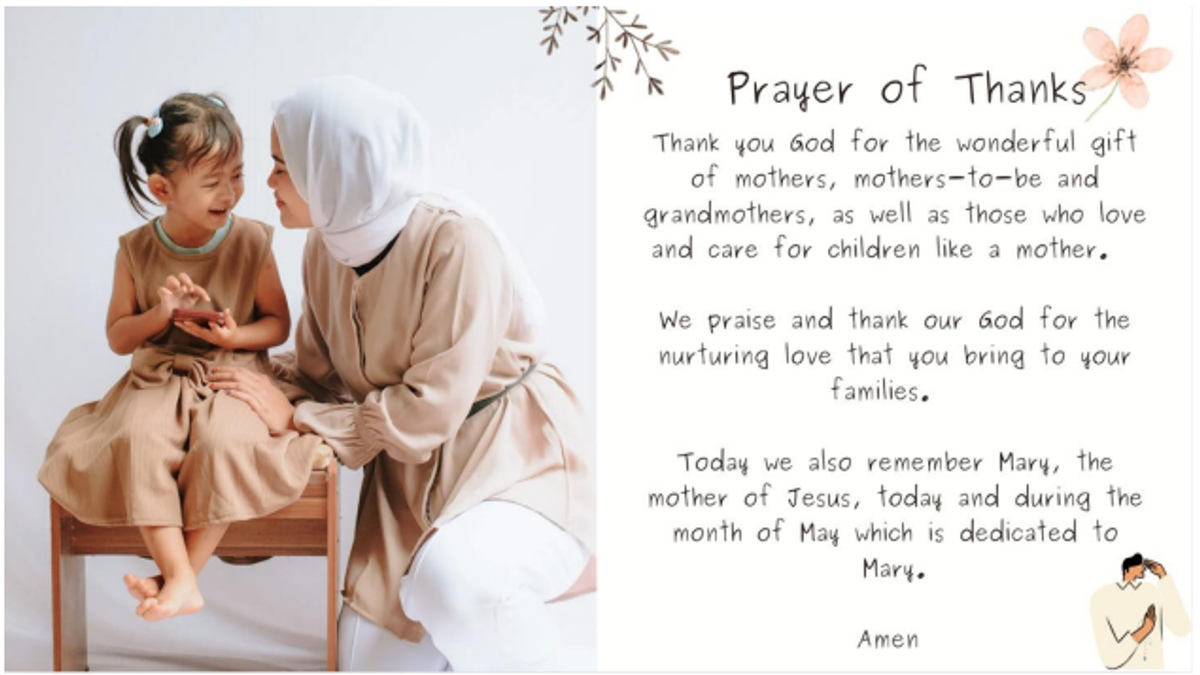From the Principal

Dear families,
We hope all the mums and special women in our school community had a happy and memorable Mother’s Day with their children.
Mother’s Day is a time to celebrate the incredible role our mums and other important women play in our lives - grandmothers, stepmothers, aunties, teachers, and friends, all of whom help shape us with love, guidance, and care.
A big thank you to our Parents and Friends' Association for organising a wonderful Mother’s Day Breakfast and Stall last week. Wednesday morning was filled with happy faces, warm conversations, and community spirit.
We also thank everyone who joined us for our Whole School Prayer, and Grade 1/2G for their thoughtful assembly and videos. Your efforts made this celebration truly special.
A New Chapter for the Catholic Church: Welcoming Pope Leo XIV
Last Friday morning, we awoke to the wonderful news of the appointment of Pope Leo XIV as the new leader of the Catholic Church. As the successor to Pope Francis, Pope Leo XIV brings with him a spirit of renewal, compassion, and unity qualities that will continue to guide and inspire us as Catholics in the years to come.
Pope Leo has expressed a strong commitment to continuing the Church’s mission of inclusion, peace, and dialogue, with a particular emphasis on caring for the vulnerable, listening to the voices of the faithful, and nurturing the spiritual and moral development of young people. His vision invites us to live out our faith through service, community involvement, and a deep connection to Gospel values in our everyday lives.
As a Catholic school community, we look forward to embracing Pope Leo XIV’s vision, continuing to walk together in faith, and inspiring our students to become compassionate leaders of hope and justice in the world.
A Message of Support for the Stevens Family
Our school community sends its love, thoughts, and prayers to the Stevens family during this incredibly challenging time.
Recently, Jake Stevens experienced a life-altering health emergency that has deeply impacted his mobility and everyday life. He now faces a long road to recovery, supported by his devoted wife Carli and their two boys, Levi (14) and Louie (10).
As they begin to navigate this new chapter together, there are many immediate needs the family is facing. We invite our community to stand beside them with compassion and practical support. If you're able, please consider donating or sharing their GoFundMe page.
The Parents & Friends Association are currently planning a fundraising initiative to support the Stevens family.
Learning and Teaching
Decodable readers
Soon, students in the junior area will begin bringing home decodable readers. These books are designed to give students the chance to practise the skills they have learned at school and support their growing knowledge of letter-sound relationships. They also help children sound out words, read tricky words, and build vocabulary with confidence.
Tips for reading together
Set a Routine
Create a calm, regular time each day for reading - after dinner, before bed, or after school.
Look at the cover together
Talk about the pictures, and make predictions about the story before starting. Read the title aloud. Ask your child questions.
Encourage Finger Pointing
For early readers, pointing to each word helps with one-to-one correspondence.
Let Them Try First
Give your child time to sound out words before jumping in. Prompt gently if needed (e.g., “What sound does that letter make?”).
Use the Pictures for Support
Teach them to look at the illustrations to help figure out tricky words or understand the story better.
Reread Familiar Books
Repetition builds fluency and confidence. Encourage rereading books they’ve already read. Rereading helps your child develop fluency and read with better expression.
Celebrate Small Successes
Praise effort, not just correctness. Say things like, “I love how you tried to sound that out.”
Talk About the Book
After reading, ask simple questions: “What happened?” “What was your favourite part?” “Why do you think the character did that?” This helps with comprehension and makes sure they understand what they’ve read.
Model Reading Aloud
Occasionally, read a page to demonstrate expression, tone, and fluency.
Avoid Over-Correcting
If the error doesn’t change the meaning, it’s okay to let it go sometimes. Focus on overall comprehension and enjoyment. Don’t jump in too quickly to correct them; this can help build their confidence. If they need a little help, encourage them to have a go at solving the word, and if they’re still having trouble, you can demonstrate the word for them. If it’s a tough word, you can say it for them.
Keep It Fun
Use different voices, act out parts, or let your child read to a pet or stuffed animal.
Grade 5/6 Camp – Araluen Lutheran Camp, Anglesea
A friendly reminder that our Grade 5/6 students will be heading to Araluen Lutheran Camp in Anglesea for their school camp next week - from Monday, May 19th to Wednesday, May 21st. A packing list was sent home last week with a digital copy also shared via PAM.
Winter School Uniform (Term 2 & 3)
A reminder that all students should now be in full winter uniform. If, for any reason, your child is not in full winter uniform, please email their classroom teacher to let them know. I understand that some students may still be waiting for certain pieces, and I thank you for keeping us informed.
A Survey will be sent to families over the weekend regarding our current uniform. Your input will be greatly appreciated.
SchoolTV
This week on SchoolTV you will find a focus topic on school refusal.
“School refusal is a complex issue as there’s rarely a single cause. It may be linked to separation anxiety, worries about leaving home, a phobia, depression, social problems or learning difficulties. It can start gradually or happen suddenly.”
Dr Michael Carr-Gregg
"Though many children will refuse to go to school at some stage in their lives, school refusal is very different to truancy. It is a more serious condition than separation anxiety and often stems from a child’s anxiety about school. They may be worried about their school work, interacting with other kids, dealing with teachers, playing sports or being away from family. School refusal is a behaviour that can also be accompanied by sadness or depression, physical symptoms and social isolation. This condition is equally common amongst boys and girls, from all socioeconomic groups and across both primary and secondary levels."
Click on the link below to access a wealth of videos, articles, and resources on the aforementioned topics.
All Editions | St Patrick's School - Ballarat (schooltv.me)
Kind regards,
Ben Shields



